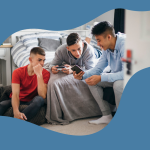Do you ever avoid going to sleep despite knowing you’ll wake up exhausted the next morning for doing so? You might be experiencing “revenge bedtime procrastination,” the intentional sacrifice of sleep in exchange for leisure time driven by the lack of downtime throughout the day.
As enticing as it may seem in the moment, continuous late nights followed by early mornings can lead to insufficient sleep and sleep deprivation. Not getting enough sleep is linked to significant negative effects on mental, emotional, and physical well-being in the short- and long-term. For more on how sleep impacts our health, check-out Gateway to Solution’s blog “The Power of a Good Night’s Sleep.”
What does bedtime procrastination look like?
Not every late night followed by an early morning is considered revenge bedtime procrastination. Rather, this sacrifice of sleep is marked by:
- A delay in going to sleep results in less time spent sleeping that night
- Awareness of the negative consequences that may follow an insufficient night’s sleep (e.g., difficulty waking up in the morning, tiredness through the day, etc.)
- The lack of a valid reason for staying up later than intended (e.g., a work deadline, an underlying illness, an external obligation, etc.)
Procrastination can be of getting into bed, falling asleep once in bed, or a mixture of both.
Those avoiding sleep will often instead prioritize enjoyable activities such as playing video games, hanging out with friends, watching television, or scrolling through social media.
Why is it considered “Revenge”?
The term “revenge bedtime procrastination” is a rough translation of a phrase initially popularized in China, “bàofùxìng áoyè .”The phenomenon, however, is widespread.
Those with schedules frequently void of sufficient free time, time for socializing, engaging in enjoyable activities, relaxation, and a sense of self outside of tending to one’s demanding responsibilities withers away. To reclaim a few hours at the end of the day for relaxation and entertainment, one may turn to the one thing they feel they can control: when they go to sleep. Thus, foregoing sleep for a little extra time is seen as getting “revenge” for the lack of freedom experienced during the daytime hours.
What are the consequences of bedtime procrastination?
Beyond difficulty waking up the next morning and feeling sluggish throughout the day, sleep deprivation can severely affect our health.
Because sleep plays such an important role in nearly all areas of functioning throughout the body, the adverse effects of sleep deprivation are just as widespread. A persistent lack of sleep has been associated with a significant increase in the risk of:
- Cardiovascular diseases, including high blood pressure, coronary heart disease, heart attack, and stroke
- Worsening immune functioning, including poorer response to vaccines
- Obesity due to an increase in the “hunger hormone” ghrelin and a decrease in the “appetite-control hormone” leptin (The John Hopkins University, 2022)
- Developing pain or worsening of pre-existing pain
- Mental health disorders like depression and anxiety
- Mood disturbances, such as irritability and stress
- Poor cognitive functioning includes slower thinking, reduced attention span, worsened memory, and poorer/riskier decision-making.
It is by no means an exhaustive list of the consequences of sleep deprivation. Still, it provides some insight into the impact of sleep on how our body functions, the benefits of getting a great night’s sleep on our health, and why revenge bedtime procrastination is not something to ignore.
How to prevent bedtime procrastination
If you are struggling with revenge bedtime procrastination, the best antidote is healthy sleep hygiene.
“Sleep hygiene” refers to the practices that go into getting a good night’s sleep, including daily habits, bedtime preparation, environment, and routine. Read through some tips for each of these categories below. It is not necessary to be overly strict or ridged about applying every one of the recommendations to see an improvement in your sleep; rather, identify a handful of tips—some from each category—that isn’t yet incorporated into your routine but seem feasible to add and start there.
- Daily Habits
- Get exposure to sunlight for at least 30 minutes a day. Exposure to sunlight helps support our circadian rhythm, i.e., our body’s internal clock. This internal clock is integral to our body’s functioning in a whole host of ways, possibly the most well-known (and one of the most important) being our sleep-wake cycle.
- Incorporate physical activity. Physical activity throughout the day can decrease the time it takes to fall asleep once in bed and can ward off sleepiness during daytime hours.
- Limit caffeine intake to the morning. Because it is stimulating, consuming caffeine in the afternoon or evening can make it more difficult to fall asleep when bedtime rolls around. If you find you can’t make it through the day without a mid-afternoon cup of coffee (or two), it is a good indicator that you’re not getting enough sleep at night.
- Limit alcohol intake. For some, alcohol can make it easier to fall asleep, but sleep quality is significantly compromised.
- Don’t eat dinner too late. Give yourself a few hours between a big meal and going to sleep, so digestion doesn’t cause any disruptions. If you do get hungry, listen to your body and munch on some lighter snacks.
- Don’t drink too much liquid too late. Drinking too much too late is likely to cause disruptions in trying to fall asleep and stay asleep, as you’ll inevitably wake up to use the bathroom. Try limiting your fluid intake for a couple of hours before bed. If you get thirsty, listen to your body and have small sips of water.
- Restrict in-bed activities to sleep (and sex). Our minds link activities with the space in which we do them. To build and protect the link between sleeping and being in bed, it’s important not also to link being in bed with, for example, working from home, watching TV, or scrolling through our phones. Sex is the exception.
- Bed-Time Preparation
- Develop and implement a consistent routine. Following the same regimen each night before bed (e.g., showering, brushing your teeth, putting on pajamas) indicates to your body that sleep time is approaching.
- Avoid electronics for 30-60 minutes before sleep. Not only do televisions, cell phones, tablets, and laptops emit a blue light that can decrease melatonin production (which aids in the timing of our sleep-wake cycle), but they also cause a mental stimulation that’s hard to wind down from.
- Give yourself 30 minutes to relax before sleep. Try to slow down and relax for half hour before going to sleep. It may look like gentle stretching, soft lighting, listening to calming music, diffusing calming scents (e.g., lavender), reading, etc.
- Dim the lights. If possible, stick to warmer, dimmer lights to illuminate your space before sleep. Lights that are too bright can decrease your body’s melatonin production before bed, making it more difficult to fall asleep.
- If you can’t sleep, don’t stay in bed. If you are not asleep after 20-25 minutes of being in bed, get up and do something relaxing in a dimly lit space until you begin feeling sleepy. Because we want to be in bed to be associated with actually being able to fall asleep, it’s best not to spend too much time tossing and turning without intervening.
- Focus on relaxing, not falling asleep. Focusing on falling asleep can cause more stress and anxiety than it may help. Instead, try making your goal to relax. Paced breathing, meditation, listening to sleep-based podcasts, and mindfulness are some relaxation techniques that can help in winding down for bed.
- Environment (Bedroom)
- Keep the temperature of your room cool. The best temperature to sleep is approximately 65ºF, give or take a couple of degrees, depending on the person.
- Make sure it’s dark. Block out any light that may seep into your room during sleeping hours. As mentioned, light has a significant effect on our circadian rhythm and our sleep-wake cycle. Black-out curtains or an eye mask are great to keep light from interrupting your sleep.
- Make sure it’s quiet. Whether it be the off-and-on humming of the air conditioner, cars, and sirens outside, or the noise of a television from the other room, noise can keep you awake or disrupt your quality of sleep once you’ve fallen asleep. If you cannot control the noise, try using earplugs or a white noise machine if you find those uncomfortable.
- Prioritize a comfortable bed. It includes your mattress, sheets, and pillows. A comfortable and supportive bed is important for a good night’s sleep, voiding of pains and strains.
- Routine
- Have a set sleep schedule. Your routine should consist of falling asleep and waking up at the same time each day. Consistency is important here: having a routine helps your body develop a sleep-wake rhythm, aiding in falling asleep and waking up more easily.
- Limit naps. Naps may help get through the day, but they disrupt the body’s sleep-wake schedule when taken too late in the day. If you feel you need a nap, aim for early afternoon and keep it relatively short.
- Make gradual adjustments. It is unrealistic to expect yourself to create a 180º change in your sleep hygiene practices overnight. Start with small step-by-step adjustments and build upon your goals gradually, giving yourself time to adjust along the way.
Remember that nothing happens overnight and that consistency is key here. Night one of implementing healthier sleeping habits may not be all that different than the night before, but with repetition and time, you will notice your body responding better to sleep cues. Additionally, the more consistent you are in a routine, the more it becomes habitual. In other words, the more consistently a bedtime routine is implemented, the more “automatic” it becomes, warding off the dreaded bedtime procrastination.
If you’re struggling to make helpful changes to your sleep routine or the stress driving the revenge bedtime procrastination is overwhelming, and you’re not sure where to start, consider reaching out to a licensed mental health clinician for additional support and guidance.



